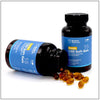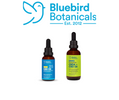CBN vs CBD: Is CBN the Next Big Thing in Wellness? Here’s What You Need to Know
In recent years, there’s been a growing buzz around minor cannabinoids, and CBN, or cannabinol, is catching the spotlight. Unlike its more famous siblings like THC and CBD, CBN is emerging as a potential game changer in the wellness space. Many are curious about its benefits, especially regarding relaxation and sleep. So, what exactly is CBN, and how does it fit into the wellness trend? Let’s take a closer look at this intriguing cannabinoid and what it could mean for your wellness routine.
Ongoing cannabinoid research is shedding light on the applications, interactions with medications, and biological effects of cannabinoids, including their potential benefits and risks for issues like sleep support.
Key Takeaways
-
CBN is a non-psychoactive cannabinoid derived from THC degradation.
-
It interacts with the body's endocannabinoid system to promote relaxation.
-
Unlike CBD, CBN is often used for nighttime wellness and relaxation.
-
CBN is legal in the U.S. as long as it comes from hemp and contains less than 0.3% THC.
-
When buying CBN products, look for quality, strength, and third-party lab testing.
Introduction
The Increasing Attention Around Minor Cannabinoids
It feels like every day there’s a new cannabinoid popping up in the wellness world. While CBD has been the star for a while, other minor cannabinoids are starting to get their moment. People are curious, and for good reason. These compounds, found in smaller amounts in the cannabis plant, might have unique properties that could contribute to our overall well-being.
CBN, or cannabinol, is one of these up-and-comers. Like other cannabinoids, CBN is derived from Cannabis sativa and has unique properties. It’s gaining traction as a potential for sleep support and relaxation, but its potential goes beyond that. We’re going to explore what makes CBN special and how it might fit into your wellness routine.
What Is CBN and Where Does It Come From?
How CBN is formed from THC degradation
Okay, so, CBN isn't just hanging out in the cannabis plant waiting to be discovered. It's more like a byproduct, a result of THC aging. Think of it as THC's chill older sibling. When THC is exposed to things like heat, light, or even just time, it starts to break down. This process, called oxidation, turns THC into CBN. So, the longer a cannabis product sits around, the more CBN it's likely to have. It's why older cannabis flowers often have higher CBN levels. It's kind of like how a fine wine ages, but instead of getting better flavor, the THC converts to CBN.
History and Research
CBN has been around for a while, but it’s only recently started getting the attention it deserves. It was first isolated way back in the late 1800s, but for a long time, it was overshadowed by THC and CBD. Research into CBN is still in its early stages, but what we’re seeing so far is pretty interesting.
Here’s a quick rundown:
-
Early research focused on CBN’s potential sedative effects.
-
More recent studies are exploring its role in managing occasional body aches and discomfort.
-
Scientists are also looking at its potential anti-inflammatory properties but much more research is required in this area.
Recent studies are also focusing on the correct cannabinoid and terpenoid doses for optimizing wellness benefits.
While the research is promising, it’s important to remember that we’re still learning about CBN. More studies are needed to fully understand its effects and potential benefits. But the initial findings are definitely encouraging, and it’s exciting to see where the research goes from here.
Legality
Because CBN comes from the cannabis plant, its legal status can be a little complicated. Like other cannabinoids, the legality of CBN often depends on its source. CBN derived from hemp (with less than 0.3% THC) is federally legal in the United States, thanks to the 2018 Farm Bill. However, state laws can vary, so it’s always a good idea to check your local regulations. CBN extracted from marijuana plants falls under different rules, and may be classified as a controlled substance in states where marijuana remains illegal.
How Does CBN Work in the Body?
Endocannabinoid System
Let’s talk about the endocannabinoid system, or ECS. It’s this massive network in our bodies, kind of like a control center, and it helps keep everything balanced. Think mood, sleep, appetite – the ECS is involved. It’s made up of receptors, and these receptors are all over the place, from our brains to our immune cells. Cannabinoids, like CBN, interact with these receptors, which is how they can have different effects on us. Cannabinoids like CBN are also being explored as part of complementary and integrative wellness approaches.
CBN’s Role vs CBD
So, how does CBN fit into all this? Well, it interacts with the ECS, but not in the same way as, say, THC. CBN has a weaker binding affinity to CB1 receptors in the brain compared to THC, meaning it’s less likely to cause that ‘high’ feeling. Instead, it seems to have more of a relaxing effect. And when you compare it to CBD, which mainly influences the ECS indirectly, CBN seems to have a more direct impact on certain receptors. It’s all about finding the right balance for your body. CBN also seems to work well with other natural ingredients. For example:
-
CBN can be combined with CBD.
-
CBN can be combined with melatonin.
-
CBN can be combined with botanicals known for their calming properties.
CBN works in harmony with the body’s natural circadian rhythms. The body follows an internal clock that signals when it’s time to be alert and when it’s time to rest. CBN interacts with the endocannabinoid system (ECS) in a way that may support this natural process, helping the body transition into a more relaxed state.
CBN vs CBD: Are They the Same?
Comparison of Effects, Source, and Uses
When exploring the world of cannabinoids, it’s easy to wonder about the differences between CBN and CBD. While both come from the cannabis plant, they have distinct properties. CBN, or cannabinol, is primarily known as a byproduct of THC degradation, whereas CBD, or cannabidiol, is abundant in hemp plants. Both CBN and CBD are being explored for their potential benefits in supporting sleep. Let’s break down their differences:
|
Feature |
CBN |
CBD |
|
Source |
THC degradation |
Hemp plant |
|
Primary Effect |
Relaxation that may help with better sleep |
Balance, overall well-being |
|
Psychoactivity |
Generally not psychoactive (less than THC) |
Non-psychoactive |
|
Common Uses |
Sleep support, calming effects |
Stress relief, occasional body ache management, general wellness |
-
CBN is often associated with promoting relaxation and helping with sleep.
-
CBD is widely used for daily balance and overall well-being.
-
Many products combine the two for a more well-rounded experience.
It’s important to remember that research on CBN is still emerging. While anecdotal evidence suggests potential benefits, more studies are needed to fully understand its effects. CBD, on the other hand, has a more extensive body of research supporting its various uses.
CBN in Full-Spectrum and Broad-Spectrum Products
Why Product Type Matters?
When shopping for CBN, it’s important to consider whether you’re looking at Full-spectrum CBD Oil or Broad-spectrum CBD. The type of product can influence not only the presence of CBN but also how it interacts with other compounds. Full-spectrum products contain all the naturally occurring cannabinoids, terpenes, and flavonoids found in hemp, including trace amounts of THC (less than 0.3%). This allows for the full “entourage effect,” where these compounds work together to enhance each other’s effects. CBD oils are a common form of full-spectrum and broad-spectrum products that may also contain CBN. Broad-spectrum products, on the other hand, go through an additional process to remove THC, while still retaining other beneficial compounds. This is a good option for those who want to avoid THC altogether but still benefit from a range of cannabinoids.
How to Read Labels for CBN Content
Understanding how to read labels is key to ensuring you're getting the CBN content you expect. Here's what to look for:
-
Total Cannabinoid Content: Look for the total amount of cannabinoids listed, usually in milligrams (mg). This will give you an idea of the overall concentration of the product.
-
CBN Specific Amount: Check for CBN listed specifically. Some labels will clearly state the amount of CBN per serving or per container.
-
Third-Party Lab Results (COA): Always check for a Certificate of Analysis (COA) from a third-party lab. This report will verify the cannabinoid content and ensure the product is free from contaminants like pesticides and heavy metals.
It's important to note that CBN content can vary widely between products. Some products may contain only a small amount of CBN, while others may have a higher concentration. Pay attention to the listed amounts and choose a product that aligns with your needs and preferences.
It's also worth noting that the terms "CBD + CBN" or "CBD with CBN" are often used to indicate products that combine these two cannabinoids. These blends are designed to provide a more comprehensive wellness experience, leveraging the potential benefits of both compounds.
How to Buy CBD Products That Include CBN
What to look for?
Okay, so you’re ready to buy CBD products with CBN? Awesome! It’s not as simple as grabbing the first bottle you see, though. We need to be a little strategic. First, check the blend. Are you looking for a specific ratio of CBD to CBN? Some products might have a 1:1 ratio, while others might lean heavier on the CBD side. Next, concentration matters. How many milligrams of CBD and CBN are actually in each serving? This will help you dial in the right serving size for your needs.
It is crucial to choose a high-quality CBD product that includes CBN for optimal results.
But the most important thing? Lab reports. Always, always, always look for a Certificate of Analysis (COA) from a third-party lab. This report verifies the product’s contents and ensures it’s free from harmful contaminants.
Why third-party testing matters?
Third-party testing is non-negotiable when it comes to CBD Products. Why? Because it's the only way to be sure you're getting what the label says you're getting. These tests check for things like heavy metals, pesticides, and residual solvents. If a company isn't willing to provide a COA, that's a major red flag. It means they're not transparent about their manufacturing process, and you have no way of knowing what's actually in the product. For example, Bluebird Botanicals offers Downshift Oil, which contains CBN and has readily available third-party lab reports. This kind of transparency is what we should all be looking for.
Buying CBD and CBN products can feel overwhelming, but focusing on blend, strength, and, most importantly, third-party lab reports will help you make an informed decision. Don't be afraid to do your research and ask questions. Your wellness is worth it!
Conclusion
As we’ve explored, CBN is emerging as a noteworthy cannabinoid with unique properties that set it apart from CBD and THC. While research is still ongoing, the potential benefits of CBN, particularly in areas like sleep and relaxation, are generating excitement in the wellness community. Ongoing research is exploring the potential benefits of CBN for various health conditions. CBN offers a different approach to cannabinoid-based wellness, and its specific effects make it a valuable addition to the spectrum of available options.
Looking to try CBD + CBN products?
Ready to experience the potential benefits of CBN for yourself? We suggest exploring products that combine CBN with CBD for a synergistic effect. Downshift Oil from Bluebird Botanicals is a great place to begin your journey. With transparent lab reports and a commitment to quality, you can be confident in the products you choose. Give CBN a try and see how it can fit into your wellness routine!
As interest in minor cannabinoids grows, CBN stands out as a promising option. Its unique profile and potential benefits make it worth considering for those seeking natural wellness solutions. We encourage you to stay informed and explore CBN products from reputable brands to discover what it can do for you.
In conclusion, we hope this article has helped you understand the topic better. If you want to learn more or explore additional resources, visit our website today! We have plenty of information waiting for you.
Frequently Asked Questions
What is CBN?
CBN stands for cannabinol. It's a compound found in cannabis that is gaining attention for its potential wellness benefits.
How is CBN made?
CBN is created when THC, another compound in cannabis, breaks down over time. This happens naturally as the plant ages.
Does CBN get you high?
No, CBN does not produce a high like THC. It's known for its calming effects without the psychoactive side effects.
How does CBN work in the body?
CBN interacts with the body's endocannabinoid system, which helps regulate functions like sleep and mood.
How is CBN different from CBD?
While both CBN and CBD are non-intoxicating, they have different effects. CBN is often linked to promoting sleep, while CBD is more known for reducing stress via relaxation.
Can I find CBN in products?
Yes, you can find CBN in various wellness products, especially those designed for nighttime use, like gummies and oils.
Is CBN legal?
CBN derived from hemp is legal in many places, including the U.S., as long as it contains less than 0.3% THC.
How should I choose CBN products?
Look for products that are third-party tested, check the label for CBN content, and consider the product's blend and strength.
Disclaimer:
This article is for informational purposes only and is not intended to diagnose, treat, cure, or prevent any medical condition. The statements regarding CBD and sleep have not been evaluated by the Food and Drug Administration (FDA). Please consult with a healthcare professional before starting any new supplement.









